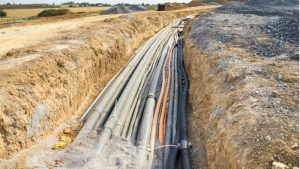The National Telecommunications and Information Administration (NTIA) said on August 17 that all 50 states, along with the District of Columbia and all U.S. territories, have filed applications for initial planning funds under the government’s Broadband Equity, Access, and Deployment (BEAD) Program that aims to distribute $42.4 billion of broadband-related grants to underserved or unserved communities.
Legislation recently introduced in the Senate aims to create a Federal grant system to help fund the construction of new broadband networks in parts of the country that either don’t have much broadband service currently available or that have service speeds of less than 100 megabits per second (Mbps) upload and 20 Mbps download.
The Federal Communications Commission (FCC) has launched the “Your Home, Your Internet” pilot program designed to raise awareness of the Affordable Connectivity Program (ACP) among households receiving Federal housing assistance.
Reps. Tim Walberg, R-Mich., and Peter Welch, D-Vt., have joined with Sens. Roger Wicker, R-Miss., and Ben Ray Luján, D-N.M., to introduce the Proper Leadership to Align Networks (PLAN) for Broadband Act, which calls on President Biden to develop a national broadband strategy.
The City of Seattle has announced its 2022 digital equity grant recipients, which include a variety of non-profits that will be receiving more than $590,000 in funding. The funding will go to 19 different organizations that will help serve over 5,000 residents all over the city to help them build the skills they need to […]
The U.S. Department of Agriculture (USDA) has announced a $401 million investment in high-speed internet access for rural communities across the United States.
Eric Frederick has been selected to be the very first Chief Connectivity Officer for the Michigan High-Speed Internet Office (MIHI).
While the Biden administration is pushing hard to increase broadband service access across the country, the White House needs to come up with a national strategy to do so on tribal lands where broadband access has traditionally lagged, the Government Accountability Office (GAO) said in a new report.
Maryland Gov. Larry Hogan has announced more than $127.6 million in broadband grants for local jurisdictions, Internet Service Providers, and community organizations, as well as education-specific grants that will expand infrastructure and provide wireless devices and equipment to Maryland’s K-12 students.
Federal Communications Commission Chairwoman Jessica Rosenworcel has put the agency’s wheels in motion to consider a four-fold increase in its definition of internet service speed that qualifies as “broadband” service.











